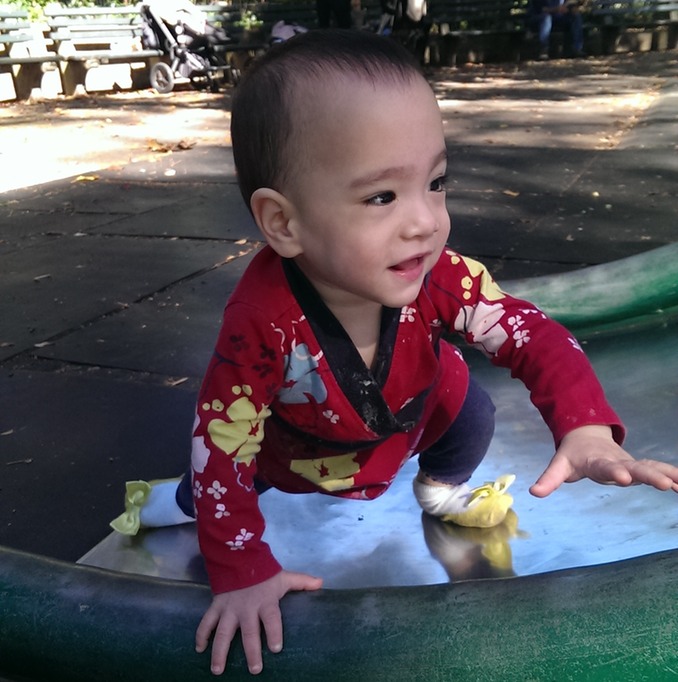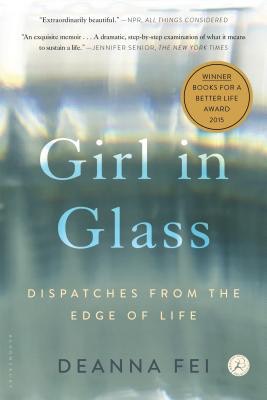
That “distressed baby” who Tim Armstrong blamed for benefit cuts? She’s my daughter.
February 2014
Late last week, Tim Armstrong, the chief executive officer of AOL, landed himself in a media firestorm when he held a town hall with employees to explain why he was paring their retirement benefits. After initially blaming Obamacare for driving up the company’s health care costs, he pointed the finger at an unlikely target: babies.
Specifically, my baby.
“Two things that happened in 2012,” Armstrong said. “We had two AOL-ers that had distressed babies that were born that we paid a million dollars each to make sure those babies were OK in general. And those are the things that add up into our benefits cost. So when we had the final decision about what benefits to cut because of the increased healthcare costs, we made the decision, and I made the decision, to basically change the 401(k) plan.”
Within hours, that quote was all over the Internet. On Friday, Armstrong’s logic was the subject of lengthy discussions on CNN, MSNBC, and other outlets. Mothers’ advocates scolded him for gross insensitivity. Lawyers debated whether he had violated his employees’ privacy. Health care experts noted that his accounting of these “million-dollar babies” seemed, at best, fuzzy.
Plenty of smart, witty people took to Twitter to express their outrage—or mock outrage. The phrase “distressed babies” became practically an inside joke, as in, “How many distressed babies does AOL pay this guy?” A few AOL employees made cracks like this: “I swear I didn't have any babies in 2012. Don't hate me for messing up your 401(k).”
For the record: It was me. I don’t work for AOL; my husband does. One of those “distressed babies” was our daughter. We pay our premiums for a family health plan through AOL, which is why we had coverage on the morning I woke up in acute pain, only five months into what had been a completely smooth pregnancy.
Late Saturday, Armstrong finally issued an apology in an email to employees: “On a personal note, I made a mistake and I apologize for my comments last week at the town hall when I mentioned specific healthcare examples.” He also announced that he would restore the old retirement savings plan. This is commendable, but the damage to my family had already been done.
Here is how we supposedly became a drain on AOL’s coffers. On Oct. 9, 2012, when I woke up in pain, my husband was at the airport about to board a flight for a work trip. I was home alone with our 1-year-old son and barely able to comprehend that I could be in labor. By the time I arrived at the hospital, my husband a few minutes behind, I was fully dilated and my baby’s heartbeat was slowing. Within 20 minutes, my daughter was delivered via emergency cesarean, resuscitated, and placed in the neonatal intensive care unit.
She weighed 1 pound, 9 ounces. Her skin was reddish-purple, bloody and bruised all over. One doctor, visibly shaken, described it as “gelatinous.” I couldn’t hold my daughter or nurse her or hear her cries, which were silenced by the ventilator. Without it, she couldn’t breathe.
That day, we were told that she had roughly a one-third chance of dying before we could bring her home. That she might not survive one month or one week or one day. She also had at least a one-third chance of being severely disabled, unable to ever lead an independent life.
As shell-shocked and stricken as we were, my husband and I were not oblivious to the staggering tolls, emotional and financial, attached to a baby like ours. Watching her tiny, battered body struggle to carry out the simplest functions, we couldn’t help wondering at what point the level of her suffering might outweigh the imperative to keep her alive.
For longer than I can bear to remember, we were too terrified to name her, to know her, to love her. In my lowest moments—when she suffered a brain hemorrhage, when her right lung collapsed, when she stopped breathing altogether one morning—I found myself wishing that I could simply mourn her loss and go home to take care of my strapping, exuberant, fat-cheeked son.
But the neonatologists also described my daughter as “feisty” and “amazing.” Over the next weeks, she fought for every minute of her young life, as did her doctors and nurses, and we could only strive to do the same.
My daughter had to spend three months in the NICU, dependent on many high-tech medical apparatuses and round-the-clock care. She endured more procedures than I can count: blood transfusions, head ultrasounds, the insertion of breathing tubes, feeding tubes, and a central line extending nearly to her heart.
Some commentators have questioned the implausibility of “million-dollar babies.” I have no expertise in health care costs, but I have a 3-inch thick folder of hospital bills that range from a few dollars and cents to the high six figures (before insurance adjustments). So even though it’s unlikely that AOL directly paid out those sums, I don’t take issue with Armstrong’s number.
I take issue with how he reduced my daughter to a “distressed baby” who cost the company too much money. How he blamed the saving of her life for his decision to scale back employee benefits. How he exposed the most searing experience of our lives, one that my husband and I still struggle to discuss with anyone but each other, for no other purpose than an absurd justification for corporate cost-cutting.
On Thursday, within minutes of Armstrong’s utterance, my husband began fielding questions from colleagues: Wasn’t the CEO talking about his baby? Focused as he was on his job as an editor—who then had to assign neutral coverage of this brewing business story—he struggled to grasp that the baby behind the headlines was our daughter. That her near-death was already becoming fodder for reporters to gleefully note Armstrong’s previous gaffes, a titillating item of news gossip for his colleagues to pick over.
At home with our daughter, I found myself again unable to look at her without recalling her clinging to life support. Since her arrival, I’ve rarely been free from some form of torment over her premature birth. The months of pumping breast milk for a baby who might not live to drink it. The anxieties about every milestone: Will she smile? Will she lift her head? Will she crawl, talk, sing? The torturous thoughts of what I might have done wrong during my brief pregnancy, how I might have failed her as her mother.
Because the day of her birth was the furthest thing from a happy event, because so many of her first days were lived under the specter of death, I’ve never had the luxury of taking her presence for granted. Every time she wakes with a dazzling smile and goes to sleep with her soft head against my shoulder feels like a wonder. It can be a struggle to set aside my lingering trauma amid the daily realities of coordinating her care to simply celebrate the fierce, beautiful girl who has completed our family.
All of which made the implication from Armstrong that the saving of her life was an extravagant option, an oversize burden on the company bottom line, feel like a cruel violation, no less brutal for the ludicrousness of his contention.
Let’s set aside the fact that Armstrong—who took home $12 million in pay in 2012—felt the need to announce a cut in employee benefits on the very day that he touted the best quarterly earnings in years. For me and my husband—who have been genuinely grateful for AOL’s benefits, which are actually quite generous—the hardest thing to bear has been the whiff of judgment in Armstrong's statement, as if we selfishly gobbled up an obscenely large slice of the collective health care pie.
Yes, we had a preemie in intensive care. This was certainly not our intention. While he’s at it, why not call out the women who got cancer? The parents of kids with asthma? These rank among the nation’s most expensive medical conditions. Would anyone dare to single out these people for simply availing themselves of their health benefits?
Once the blowback started, Armstrong issued an internal memo—not an apology—that sought to clarify how he had “mentioned high-risk pregnancy as just one of many examples of how our company supports families when they are in need.” Then he urged employees, “Let’s move forward together as a team.”
But there was nothing high-risk about my pregnancy. I never had a single risk factor for a preterm birth, let alone one as extreme as this one. Until the morning I woke up in labor, every exam indicated that my pregnancy was perfectly healthy. In fact, had signs of trouble emerged, such as bleeding or pre-eclampsia, the doctors would have had the chance to mitigate the danger, administering steroids to speed up my daughter's lung development or hormones to delay labor. Instead, even with the best medical care available, we had no warnings, and we will never have an explanation for what went wrong. This is why the head neonatologist referred matter-of-factly to my daughter’s birth as “catastrophic.”
In other words, we experienced exactly the kind of unforeseeable, unpreventable medical crisis that any health plan is supposed to cover. Isn’t that the whole point of health insurance?
These days, at the age of 1, my daughter is nothing short of a miracle, which is to say, she appears much like any healthy baby. This past week has been eventful for her. Right around when Tim Armstrong might have been preparing for that conference call, she took her first steps, two tiny steps, before plopping down and demanding to be hugged for her efforts.
My daughter has already overcome more setbacks than most of us have endured in the span of our lives. Having her very existence used as a scapegoat for cutting corporate benefits was one indignity too many.

